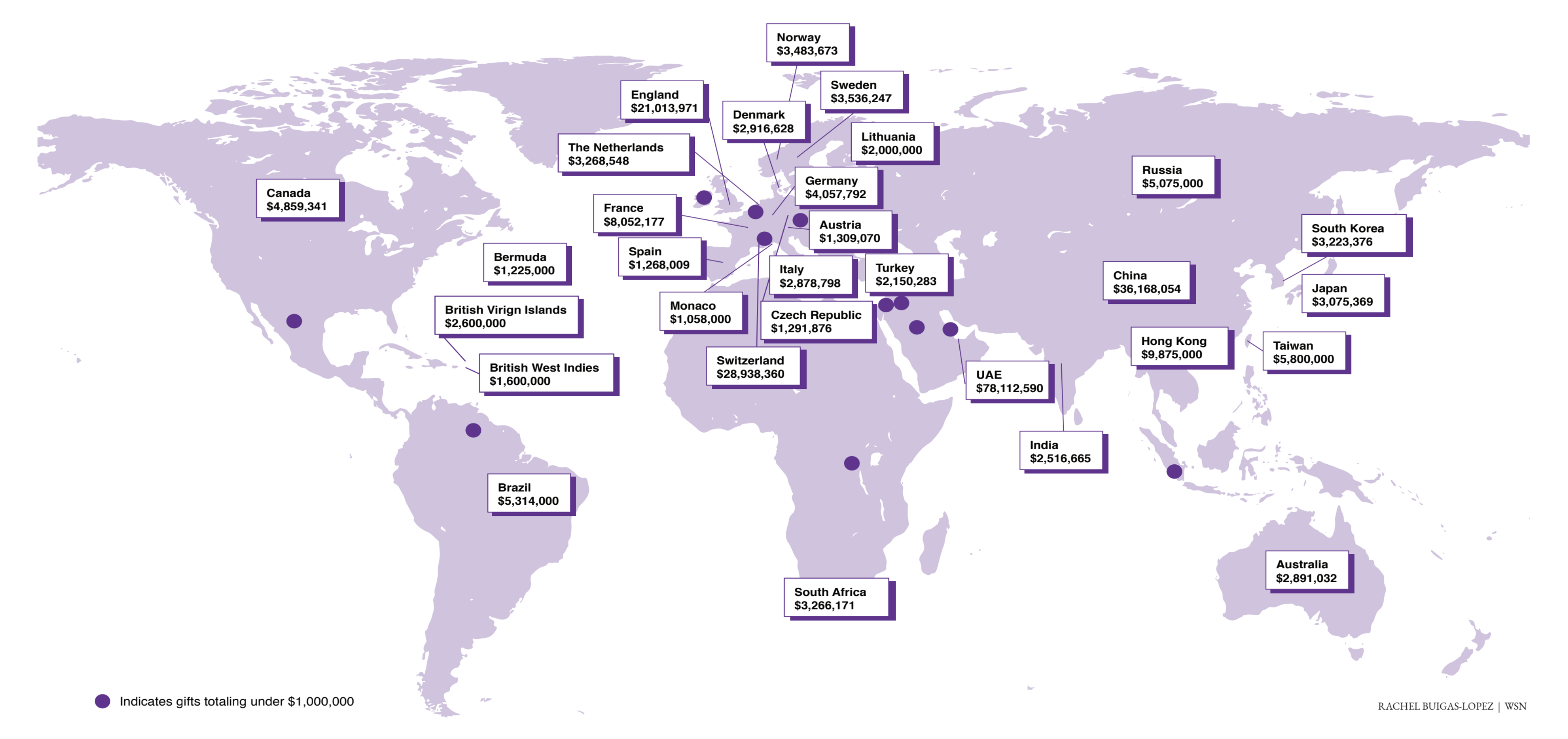The Foreign Gifts and Contracts Report, released earlier this year by the Department of Education and publicized recently by university activists on social media, revealed that NYU receives more in foreign donations than comparable universities also listed. With almost 50 percent of the $261 million total coming from the United Arab Emirates, China and Hong Kong, NYU’s global campuses may be the difference-makers.
The DOE report enumerates data from 2012 to 2018 and includes gifts of $250,000 or greater from a foreign source as well as contracts or gifts from institutions owned or controlled by a foreign source.
However, the data seems incomplete. For the year 2015, no gifts are reported by NYU until June, and the sum of all foreign gifts listed for the university in that year is about eight million dollars. In a press release from that same year, NYU boasted $85.8 million in gifts from international donors.
The data shows that NYU has received about $261 million of foreign donations over the last six years. The specific source of each gift is not named within the report, though each donation does list a country of origin.
More recent data from the years of 2016 and 2017 shows that foreign donations to NYU totaled about $105 million in gifts and contracts for those two years. The Voluntary Support of Education Survey conducted by the Council for Aid to Education, which lists total amounts raised by universities over the course of a year, shows that the sum makes up just over 10 percent of money raised by NYU.
In comparison, Columbia University received about $90 million, or 7 percent of their amount raised. Cornell University was gifted about 70 million, about 5 percent of its total amount raised and the University of Southern California was given about $104 million, about 8 percent of its donations.
A country-by-country breakdown reveals that the United Arab Emirates is by far the largest source of foreign income for NYU, gifting $78 million mostly in contracts from the location of NYU’s Abu Dhabi campus. One company, Omeir Travel, gifted a $21 million contract with NYU in 2013. The travel agency is one of the largest in the UAE.
Construction of the Abu Dhabi campus resulted in scrutiny when evidence of labor abuse surfaced in 2014. Workers said they were paid less than they were promised and beaten by police when they went on strike.
The campus has been the source of conflict since its inception, as the UAE has refused to grant certain professors visas due to religious beliefs or previous criticism of the UAE. NYU’s Journalism department proceeded to cut ties with the campus. More recently, over 200 professors signed a petition urging the university to condemn the UAE’s imprisonment of a Durham University postgraduate student, who was pardoned early Monday morning. One professor compared NYU’s connection to Abu Dhabi to a “pact with the devil.”
The DOE’s report shows that their relationship is saturated with million-dollar contracts, on top of a $10 million monetary gift from the Executive Authority of Abu Dhabi in 2014.
China and Hong Kong combined to gift $46 million in donations and contracts, with Wenliang Wang, an NYU trustee, donating $5 million himself and another $6 million through his company Rilin Enterprises. Wang previously made headlines in 2016 for donating $120,000 to former governor of Virginia Terry McAuliffe’s campaign in 2013. Wang has been a subject of scrutiny in the past for his various connections with the United States government in the context of trade and visa issues.
NYU’s $124 million from the countries home to NYU Abu Dhabi and Shanghai, its only two degree-granting campuses outside the U.S., total more than the entire foreign donations of some institutions listed on the DOE report. Boston University reported a total of $51 million in foreign donations, with Washington University, St. Louis reporting $21 million.
With much of the money from contracts, NYU’s investment in degree-granting global sites, relatively rare among other universities, may have contributed to this discrepancy in foreign funds.
Email Victor Porcelli at [email protected].
This version appeared in the Nov. 26th print edition. Email Victor Porcelli at [email protected].



























































































































































